
Find Help
More Items From Ergsy search
-

How many National Insurance contributions do I need for the basic State Pension?
Relevance: 100%
-
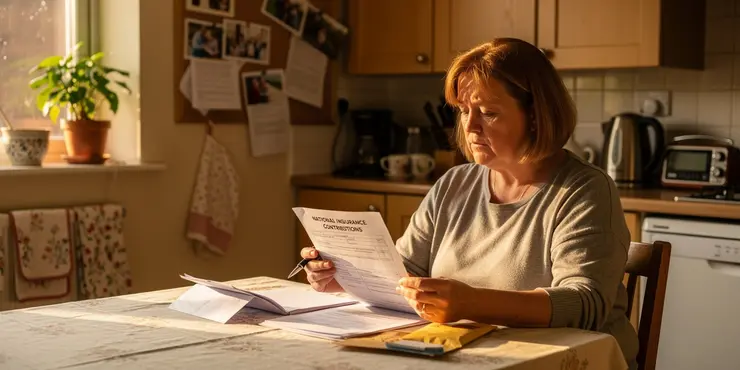
Who is eligible for the basic State Pension?
Relevance: 81%
-
Can I get the basic State Pension if I’m self-employed?
Relevance: 80%
-
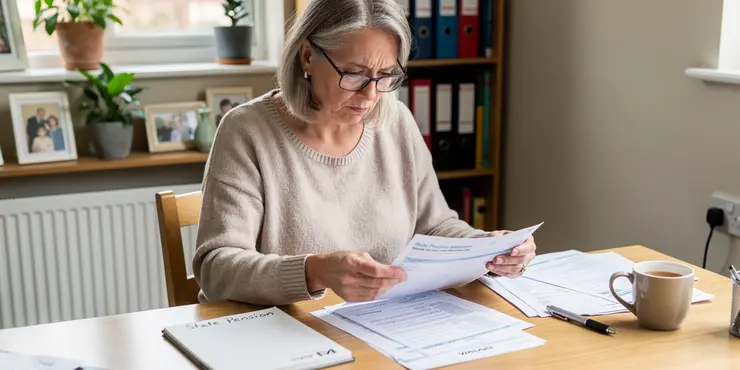
How do I claim the basic State Pension?
Relevance: 78%
-

Is there a difference between the basic State Pension and the new State Pension?
Relevance: 77%
-

Can my spouse inherit my basic State Pension?
Relevance: 75%
-
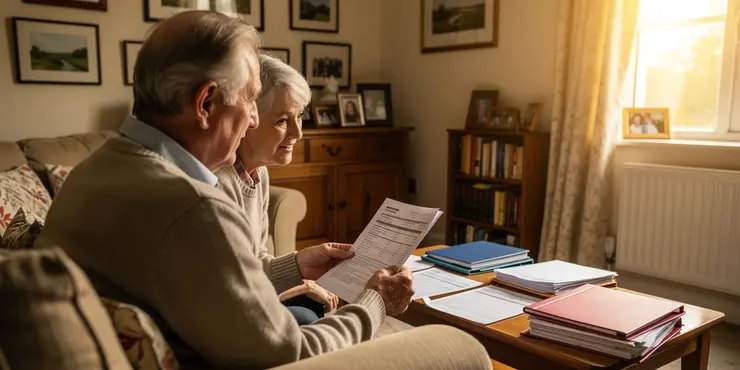
How much is the full basic State Pension per week?
Relevance: 74%
-
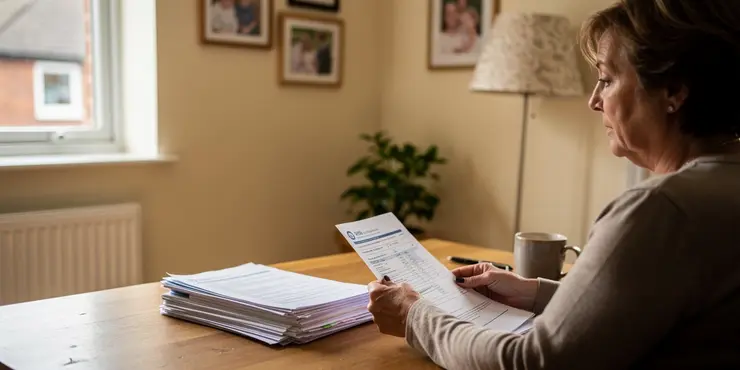
What is the basic pension in the UK?
Relevance: 73%
-

Is the basic State Pension enough to live on?
Relevance: 70%
-
Are there credits available for the basic State Pension if I can't work?
Relevance: 70%
-

Can I receive the basic State Pension if I have less than 30 qualifying years?
Relevance: 69%
-
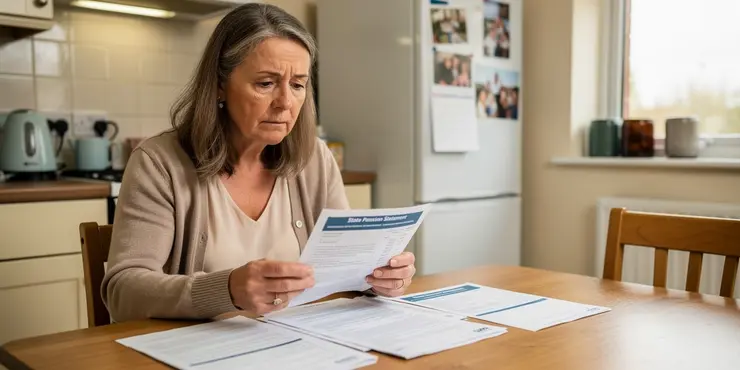
Will I qualify for the new state pension?
Relevance: 63%
-

Do I pay tax on the basic State Pension?
Relevance: 60%
-
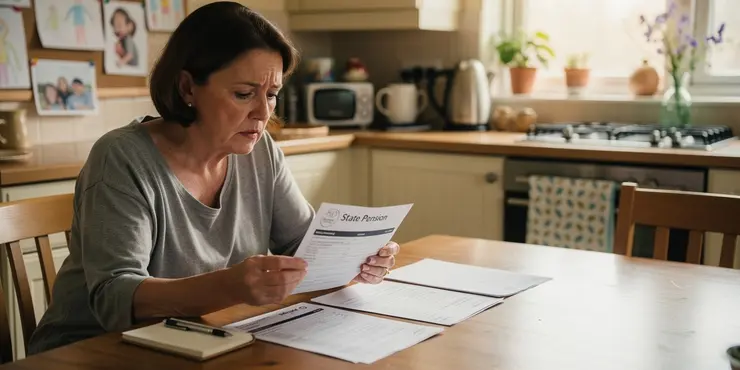
State Pension UK | How much will I get? | WILL IT LAST FOREVER?!?
Relevance: 59%
-
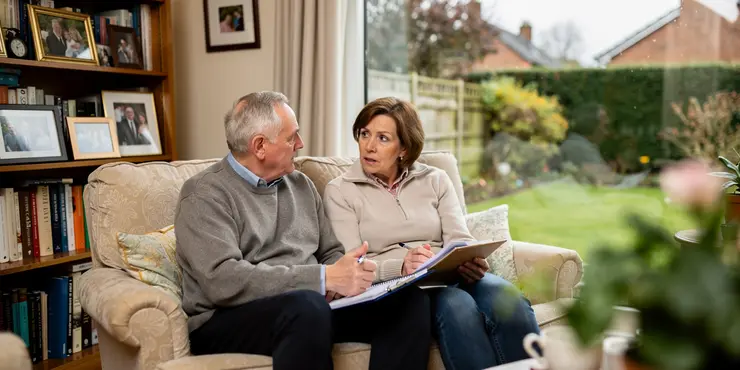
Can I defer my basic State Pension?
Relevance: 59%
-
What if I have gaps in my National Insurance record?
Relevance: 58%
-
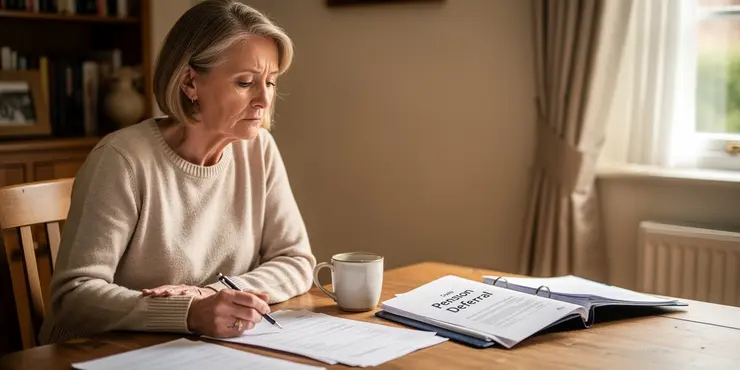
How much extra will I get if I defer my basic State Pension?
Relevance: 57%
-

How is the basic State Pension calculated?
Relevance: 52%
-
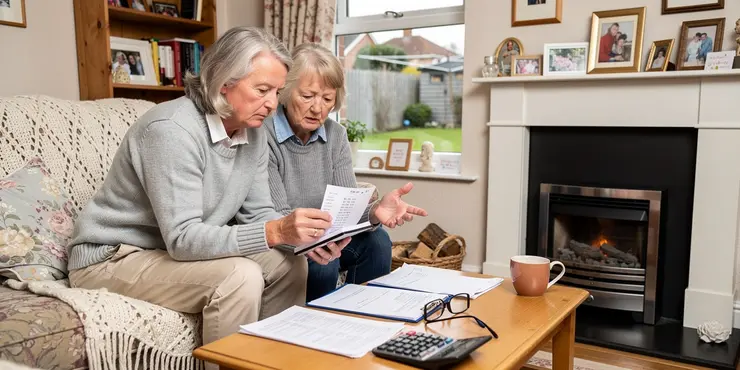
When is the basic State Pension paid?
Relevance: 51%
-
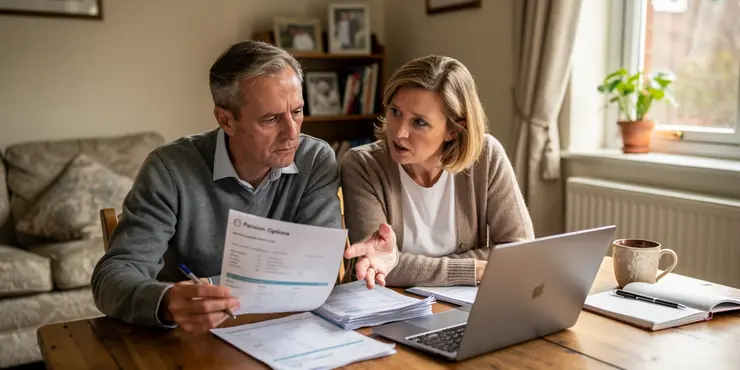
Can I get the basic State Pension if I live abroad?
Relevance: 49%
-

Can I get more than the full basic State Pension?
Relevance: 47%
-

When will the state pension age increase to 67?
Relevance: 47%
-

Will the state pension amount change with the age increase?
Relevance: 46%
-
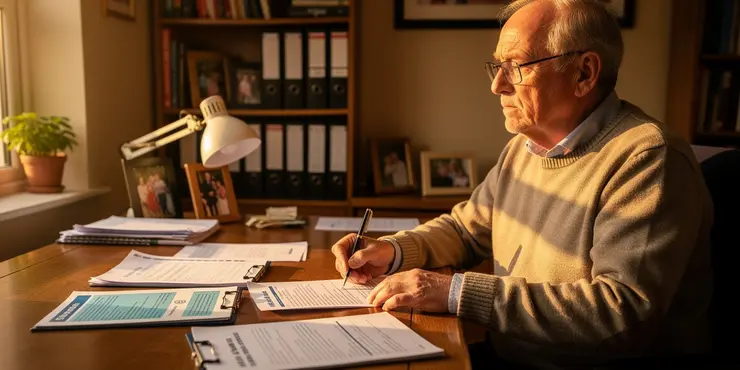
Will I lose my basic State Pension if I start working after reaching State Pension age?
Relevance: 45%
-

Is there a change in National Insurance rates for 2026?
Relevance: 45%
-

What is the state pension age in the UK in 2026?
Relevance: 44%
-
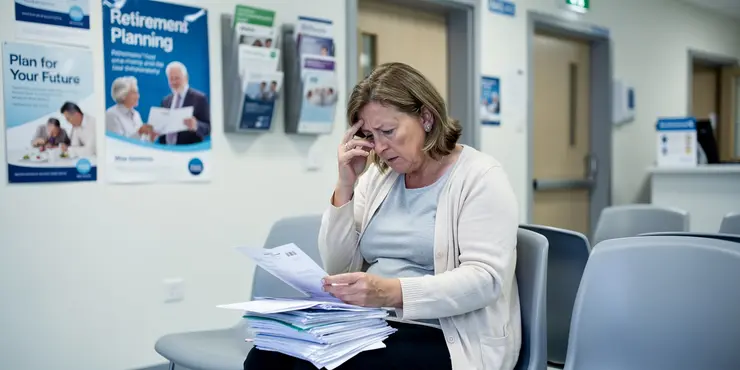
Who will be affected by the state pension age changes in 2026?
Relevance: 42%
-

Are there any changes to the state pension age in 2026?
Relevance: 40%
-

Are defined contribution pensions protected if the provider goes bust?
Relevance: 39%
-

Is there any assistance for those who cannot work up to the new state pension age?
Relevance: 38%
-

How often does the UK government review the state pension age?
Relevance: 38%
-

What demographic factors influence changes to the state pension age?
Relevance: 38%
-

5 Ways You Can Contribute More To Your NHS Pension!
Relevance: 38%
-

What are the state pension age changes in 2026 in the UK?
Relevance: 37%
-

What age group will first see the state pension age at 67?
Relevance: 37%
-

How can I find out my specific state pension age?
Relevance: 37%
-

Do firefighters have to contribute to their pension schemes?
Relevance: 37%
-

Will pension contribution allowances be affected in 2026?
Relevance: 36%
-
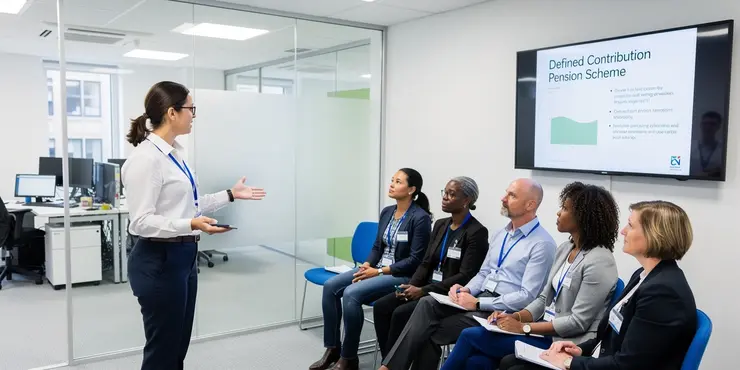
What is a defined contribution pension scheme?
Relevance: 36%
-

What is the new planned state pension age after 2028?
Relevance: 35%
Understanding National Insurance Contributions
In the United Kingdom, National Insurance contributions are payments made by employees and the self-employed to qualify for certain benefits, including the basic State Pension. These contributions help ensure financial security during retirement and provide access to additional benefits such as Jobseeker’s Allowance and Maternity Allowance.
Eligibility for the Basic State Pension
The basic State Pension is a regular payment from the UK government available to individuals who reach State Pension age and meet specific National Insurance contribution requirements. The amount you receive depends on the number of qualifying years you have contributed or received National Insurance credits.
Required Contributions for the Basic State Pension
To qualify for the full basic State Pension, individuals generally need 30 qualifying years of National Insurance contributions or credits. A qualifying year is defined as a year in which you have paid sufficient National Insurance contributions or received National Insurance credits because of unemployment, illness, or other valid reasons.
Calculating Your State Pension
If you have fewer than 30 qualifying years, the amount of State Pension you receive will be proportionately less. For each qualifying year, you earn a fraction of the full pension amount. Therefore, it is essential to know how many qualifying years you have and plan accordingly to ensure you maximize your entitlement.
Filling Gaps in Your National Insurance Record
If there are gaps in your National Insurance record, it is possible to fill them by paying voluntary contributions. This can be particularly beneficial if you are close to retiring and have not reached the full 30 qualifying years. By paying voluntary contributions, you can potentially increase your State Pension amount.
Checking Your National Insurance Record
To understand your current standing regarding State Pension entitlement, it is advisable to check your National Insurance record. The UK government provides online services where you can view your record, check for any gaps, and see how much State Pension you are likely to receive based on your contributions to date.
Conclusion
Understanding the requirements for National Insurance contributions and how they impact your State Pension is crucial for financial planning. Ensuring you have enough qualifying years will help you secure a higher pension amount upon reaching retirement age. If you have concerns about your National Insurance record or need to fill gaps, consider speaking with a financial adviser or contacting HM Revenue and Customs for guidance.
Understanding National Insurance Contributions
In the UK, people who work pay National Insurance. This money helps you get benefits like the State Pension when you stop working. It also helps if you are looking for a job or having a baby.
Eligibility for the Basic State Pension
The State Pension is money the government gives you when you are old enough. You get it if you have paid enough National Insurance. The more years you pay, the more money you get.
Required Contributions for the Basic State Pension
To get the full State Pension, you usually need to pay National Insurance for 30 years. Each year is a "qualifying year." You can also get credits if you do not work because you are sick or not working.
Calculating Your State Pension
If you have less than 30 years, you will get less money. For each year you pay, you get part of the Pension. Check how many qualifying years you have so you can plan for your future.
Filling Gaps in Your National Insurance Record
If you missed paying for some years, you can pay extra to fill those gaps. This is helpful if you are close to retiring but did not reach 30 years. Paying extra can make your Pension bigger.
Checking Your National Insurance Record
You should check how many years you have paid. The UK government has a website where you can see your record. You can also find out if you missed any years and how much Pension you can expect.
Conclusion
Understanding National Insurance is important for making sure you get enough money when you retire. Having enough qualifying years means more pension money later. If you are worried about your record, talk to a financial adviser or contact HM Revenue and Customs for help.
Frequently Asked Questions
What is the minimum number of qualifying years for basic State Pension?
You usually need at least 10 qualifying years of National Insurance contributions to be eligible for any State Pension.
How many qualifying years are required for the full basic State Pension?
You need 35 qualifying years of National Insurance contributions to receive the full basic State Pension.
Do I get a State Pension if I have less than 10 years of contributions?
Generally, you will not qualify for any State Pension if you have less than 10 qualifying years.
Can I pay voluntary contributions to increase my qualifying years?
Yes, you can pay voluntary Class 3 National Insurance contributions to fill gaps and increase your qualifying years.
Do my National Insurance contributions before April 2016 count towards my State Pension?
Yes, contributions made before April 6, 2016, count towards your State Pension under the old scheme.
How do I know how many qualifying years I have?
You can check your National Insurance record through the UK government's online service or request a State Pension statement.
What if I have gaps in my National Insurance record?
You may be able to make voluntary contributions to fill some gaps in your National Insurance record.
Can I still work and contribute after reaching State Pension age?
Yes, you can still work after reaching State Pension age, but you will no longer need to pay National Insurance contributions.
Can I increase my State Pension by deferring?
Yes, you can defer your State Pension, and for every 9 weeks you defer, your State Pension increases by 1%.
What are qualifying years for National Insurance contributions?
A qualifying year is a tax year in which you have enough National Insurance contributions or credits.
How are credits obtained for National Insurance contributions?
Credits can be obtained through things like claiming certain benefits, being a parent or foster carer, or being on certain training courses.
What is the State Pension age?
The State Pension age varies based on your date of birth and gender, but it is gradually increasing to 67 by 2028.
Can self-employed persons contribute towards the State Pension?
Yes, self-employed individuals pay Class 2 and Class 4 National Insurance contributions, which count towards the State Pension.
Do I get a pension if I've lived or worked abroad?
Your overseas contributions may count towards your State Pension if you meet certain conditions and the UK has a social security agreement with the country.
How much is the full basic State Pension?
For the 2023/2024 tax year, the full basic State Pension is £156.20 per week.
Does my spouse or civil partner receive a State Pension based on my National Insurance contributions?
Your spouse or civil partner may qualify for a State Pension based on your contributions if they do not have enough of their own.
How does the State Pension top-up scheme work?
The State Pension top-up scheme allowed people to increase their pension income by paying a lump sum, but it was only available between October 2015 and April 2017.
Will I lose my National Insurance contributions if I retire early?
Your contributions will not be lost, but retiring early could affect the number of qualifying years you accumulate if you stop contributing.
What happens if I have more than 35 qualifying years?
Having more than 35 years of National Insurance contributions will not increase your State Pension, but it ensures that you qualify for the maximum amount.
What is the State Pension forecast?
A State Pension forecast provides an estimate of how much pension you might receive when you reach State Pension age.
How many years do you need to work to get a basic State Pension?
You need to work a certain number of years to get the basic State Pension from the government. This is called "qualifying years."
To make it easier to understand, you can use tools like audiobooks or videos that explain pensions. You can also ask someone you trust to help you learn about pensions.
You usually need to have paid National Insurance for 10 years to get some State Pension money.
How many years do you need to get the full State Pension?
You must pay into National Insurance for 35 years to get the full State Pension.
Can I get a State Pension if I worked less than 10 years?
If you worked less than 10 years, you might not get a State Pension.
Want help? Try:
- Talking to someone who knows about pensions.
- Using online tools or guides to learn more.
- Asking a friend or family member to help you understand.
If you have worked for less than 10 years, you usually cannot get a State Pension.
Can I pay extra to get more qualifying years?
Yes, you can pay extra money to fill in your National Insurance gaps. This helps you get more qualifying years for benefits.
Do my National Insurance payments before April 2016 help me get my State Pension?
Yes, the money you gave for National Insurance before April 2016 can help you get your State Pension.
If you need help understanding, you can ask someone you trust to explain.
It might be useful to use a calendar to mark important dates. You can also use pictures or drawings to help you remember things.
Yes, money you paid before April 6, 2016, helps with your State Pension under the old rules.
How can I find out how many qualifying years I have?
Here is how you can check:
- Go to the government website about National Insurance.
- Look for the section where you can check your National Insurance record.
- Logging into your account might be needed, so have your details ready.
- Follow the steps on the screen to see your qualifying years.
It might help to ask a family member or a friend to assist you.
You can also use tools like Read Aloud software to help you understand the information better.
You can look at your National Insurance record online by using the UK government's website. You can also ask for a paper that tells you about your State Pension.
What happens if there are missing parts in my National Insurance record?
Don't worry if your National Insurance record isn't complete. Here are some tips to help:
- You can check your record to see what's missing. Visit the National Insurance website or ask for help at the local office.
- If you're missing some parts, you might be able to pay them later. This is called 'making up gaps'.
- Talking to someone can help. Ask a friend or family member for support if you need it.
- There are videos and audio guides online that can explain more. Look for these if reading is tricky.
You might be able to pay extra to cover missing parts in your National Insurance record.
Can I work and pay money in after I get my State Pension?
Yes, you can still work even after you start getting your State Pension. Here is what you need to know:
- You can keep your job or get a new one.
- You may still pay some taxes if you earn enough.
- It's a good idea to talk to someone about money, like a financial advisor, to know what is best for you.
If you have trouble reading, you can:
- Ask someone you trust to help you.
- Use a computer or a phone to read the text out loud.
- Break the text into small parts and read slowly.
Yes, you can still work after you get your State Pension. You will not have to pay National Insurance anymore.
Can I make my State Pension bigger by waiting to claim it?
If you wait to claim your State Pension, you can get more money later. This means you "defer" your pension. Here is how it works:
- If you do not take your pension right away, it grows a bit each week.
- When you finally take it, you get a larger amount.
This can be good if you do not need your pension money right now. You can read more about it or talk to someone who knows about pensions. You can also use tools like a calculator to see how much extra money you could get.
Yes, you can wait to start your State Pension. If you wait for 9 weeks, your State Pension will go up by 1%.
What are qualifying years for National Insurance contributions?
Qualifying years are the years you pay National Insurance. You need these years to get a State Pension.
- Each year you work and pay National Insurance counts.
- These years help you get money when you are older and stop working.
Helpful tools:
- Use pictures and charts to understand better.
- Ask someone for help if you need to know more.
A qualifying year is a year when you have paid or received enough National Insurance. This is used to help with taxes.
How do you get credits for National Insurance?
You can get credits in different ways. You might get them if you get certain benefits, if you are a parent, if you take care of foster children, or if you go to certain training courses.
What is the State Pension age?
The State Pension age is the age when you can start getting money from the government after you stop working.
To help you understand better, you can:
- Use pictures or drawings.
- Ask someone to read it to you.
- Look for videos about State Pension age.
The age you can get the State Pension changes. It depends on when you were born and if you are a man or a woman. But by the year 2028, most people will have to be 67 to get it.
Can people who work for themselves pay into the State Pension?
If you work for yourself, you pay something called Class 2 and Class 4 National Insurance. This helps you get a State Pension when you are older.
Can I get a pension if I lived or worked in another country?
If you have lived or worked in another country, you might still get a pension. It's good to check the rules about pensions in both countries.
Here are some tips to help:
- Talk to a pension expert. They can help you understand what you need to do.
- Use simple tools online to see if you can get a pension. These tools can guide you step by step.
- Write down all the places you lived or worked. This can make it easier to check your pension.
Your work in another country might help you get a State Pension in the UK. For this to happen, you must meet some rules and the UK needs to have a special agreement with that country.
What is the full State Pension amount?
For the year 2023 to 2024, the full basic State Pension is £156.20 each week.
Can my husband, wife, or civil partner get a State Pension because of my National Insurance payments?
Your husband, wife, or civil partner might get a State Pension because of the money you have paid. This can happen if they have not paid enough themselves.
How does the State Pension top-up scheme work?
The State Pension top-up helps you get more money when you retire.
You can pay extra money now to get a bigger pension later.
Here is a way to make it easier:
- Ask someone to help you understand letters about pensions.
- Use a calculator to see how much more money you will get.
- Ask at a local advice center or call a pension helpline for help.
The State Pension top-up was a way for people to get more money in their pension. To do this, they paid a big amount of money at once. But this was only possible from October 2015 to April 2017.
What happens to my National Insurance payments if I stop working early?
If you stop working early, your pension savings will stay safe, but you might have fewer years that count towards your pension if you stop putting money in.
What happens if I have more than 35 qualifying years?
If you have more than 35 qualifying years, here is what it means:
- You already have enough years to get the full State Pension.
- Having more years does not increase your State Pension.
If you find it hard to understand this, you might:
- Look at pictures or diagrams that explain pensions.
- Ask someone you trust to help you.
- Use apps that read the text out loud.
If you have worked for over 35 years and paid National Insurance, you will get the most money you can from the State Pension.
What is the State Pension forecast?
A State Pension forecast tells you how much money you might get when you stop working because you are older.
Here are some things you can do:
- Use a calculator tool to see how much money you might get.
- Ask someone you trust for help if you’re not sure how to check.
It’s like a little plan to know about your money for the future.
A State Pension forecast tells you how much money you might get when you are old enough to receive your State Pension.
Useful Links
This website offers general information and is not a substitute for professional advice.
Always seek guidance from qualified professionals.
If you have any medical concerns or need urgent help, contact a healthcare professional or emergency services immediately.
Some of this content was generated with AI assistance. We’ve done our best to keep it accurate, helpful, and human-friendly.
- Ergsy carfully checks the information in the videos we provide here.
- Videos shown by Youtube after a video has completed, have NOT been reviewed by ERGSY.
- To view, click the arrow in centre of video.
- Most of the videos you find here will have subtitles and/or closed captions available.
- You may need to turn these on, and choose your preferred language.
- Go to the video you'd like to watch.
- If closed captions (CC) are available, settings will be visible on the bottom right of the video player.
- To turn on Captions, click settings .
- To turn off Captions, click settings again.
More Items From Ergsy search
-

How many National Insurance contributions do I need for the basic State Pension?
Relevance: 100%
-

Who is eligible for the basic State Pension?
Relevance: 81%
-
Can I get the basic State Pension if I’m self-employed?
Relevance: 80%
-

How do I claim the basic State Pension?
Relevance: 78%
-

Is there a difference between the basic State Pension and the new State Pension?
Relevance: 77%
-

Can my spouse inherit my basic State Pension?
Relevance: 75%
-

How much is the full basic State Pension per week?
Relevance: 74%
-

What is the basic pension in the UK?
Relevance: 73%
-

Is the basic State Pension enough to live on?
Relevance: 70%
-
Are there credits available for the basic State Pension if I can't work?
Relevance: 70%
-

Can I receive the basic State Pension if I have less than 30 qualifying years?
Relevance: 69%
-

Will I qualify for the new state pension?
Relevance: 63%
-

Do I pay tax on the basic State Pension?
Relevance: 60%
-

State Pension UK | How much will I get? | WILL IT LAST FOREVER?!?
Relevance: 59%
-

Can I defer my basic State Pension?
Relevance: 59%
-
What if I have gaps in my National Insurance record?
Relevance: 58%
-

How much extra will I get if I defer my basic State Pension?
Relevance: 57%
-

How is the basic State Pension calculated?
Relevance: 52%
-

When is the basic State Pension paid?
Relevance: 51%
-

Can I get the basic State Pension if I live abroad?
Relevance: 49%
-

Can I get more than the full basic State Pension?
Relevance: 47%
-

When will the state pension age increase to 67?
Relevance: 47%
-

Will the state pension amount change with the age increase?
Relevance: 46%
-

Will I lose my basic State Pension if I start working after reaching State Pension age?
Relevance: 45%
-

Is there a change in National Insurance rates for 2026?
Relevance: 45%
-

What is the state pension age in the UK in 2026?
Relevance: 44%
-

Who will be affected by the state pension age changes in 2026?
Relevance: 42%
-

Are there any changes to the state pension age in 2026?
Relevance: 40%
-

Are defined contribution pensions protected if the provider goes bust?
Relevance: 39%
-

Is there any assistance for those who cannot work up to the new state pension age?
Relevance: 38%
-

How often does the UK government review the state pension age?
Relevance: 38%
-

What demographic factors influence changes to the state pension age?
Relevance: 38%
-

5 Ways You Can Contribute More To Your NHS Pension!
Relevance: 38%
-

What are the state pension age changes in 2026 in the UK?
Relevance: 37%
-

What age group will first see the state pension age at 67?
Relevance: 37%
-

How can I find out my specific state pension age?
Relevance: 37%
-

Do firefighters have to contribute to their pension schemes?
Relevance: 37%
-

Will pension contribution allowances be affected in 2026?
Relevance: 36%
-

What is a defined contribution pension scheme?
Relevance: 36%
-

What is the new planned state pension age after 2028?
Relevance: 35%


